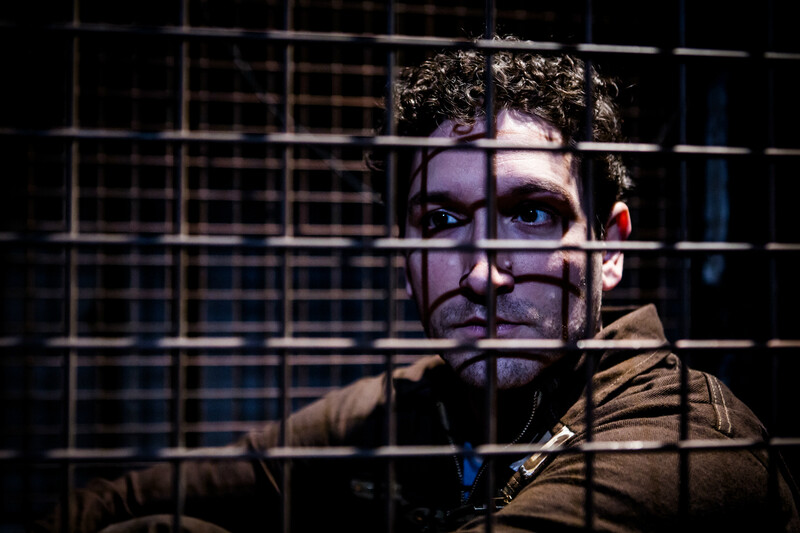The Electronic Intifada London 28 January 2014

Actor Edmund Kingsley in a performance of The Keepers of Infinite Space.
For Palestinians growing up in the militarily occupied West Bank, the threat of imprisonment in an Israeli jail is a constant and very real fear.
Since the occupation began in 1967, an estimated 40 percent of the male population has been detained under military orders. Of those, thousands have been held in a procedure known as administrative detention, in which prisoners are held indefinitely without charge or trial.
This is the theme of The Keepers of Infinite Space, a new London play written by Omar El-Khairy and directed by Zoe Lafferty. It follows the story of Saeed (played by Edmund Kingsley), a bookshop owner from Nablus, who is arrested, thrown into an Israeli prison and has his sentence renewed indefinitely.
It soon unfolds that his father Khalil (Hilton McRae), now a property developer, was held in the same prison in the 1990s for his involvement in the Palestinian resistance. The play primarily examines the brutal treatment and torture of Palestinian prisoners in Israeli jails, as well as drawing on a range of other issues surrounding the occupation.
The cast was made up primarily of British actors, which seemed an unusual casting choice given the subject matter. While it may have been preferable to see Palestinian actors take on the roles, it was perhaps intentionally jarring for a largely British audience to hear familiar British accents and dialects in such an unfamiliar, brutal environment.
Merciless
For the most part the play makes uncomfortable viewing. Scenes of beatings, humiliation and torture, both physical and psychological, are all the more unsettling for being grounded in the real experiences of Palestinian prisoners.
The Israeli army officers are the villains of the piece and are encouraged by their tyrannical captain, Abner, to completely disregard the humanity of their prisoners, referring to Saeed as “a thing – like a table.” The merciless Abner constantly refers to the Palestinians as “terrorists,” regardless of the lack of charges against them, and considers them “prisoners of war” despite the obvious lack of the pretext of war.
While glimmers of humanity are shown on the part of the prison guards, in particular the Ethiopian immigrant Ziv (Cornelius Macarthy), they ultimately keep the prison in a state of relentless fear.
The play is set entirely within the prison. With the tyranny of the guards, the constant threat of violence hanging over each scene, and the inescapable confinement, the audience can start to imagine the feeling of utter powerlessness before the might of the Israeli military system.
Other themes dealt with in this 90-minute play include the breakdown of Saeed’s marriage, the international “peace process” and the treatment of African migrant workers in Israel. This made the play feel a little too broad in its ambition and at times it was unclear what the main message was.
Symbol of betrayal
One of the most intriguing facets of the play was the representation of Rawabi, the multi-million-dollar housing project near Ramallah, as a symbol of the ultimate betrayal of the Palestinian dream.
Saeed’s father Khalil played a key role in the Palestinian resistance movement in the 1990s, but since his release from Israeli prison has become a property developer involved in the project. While Saeed and his fellow prisoners dream of a free Palestine, Khalil has abandoned the cause and focused on creating a comfortable, middle class existence in the midst of occupation.
While Saeed dreams of the sea, and he and his family “dipping their toes in that clear warm water,” his father has settled for a hilltop terrace with a view of the Mediterranean, his freedom in sight but still inaccessible.
Flashbacks to Khalil’s imprisonment in the nineties and the hope for the 1991 Madrid conference served as an uncomfortable reminder of the uselessness of the peace process. More than two decades later, Khalil’s son is having the very same experience of captivity. Indeed, while Khalil was released from prison in a negotiated deal, one of his fellow prisoners still languishes there more than twenty years later.
Torn apart
The Keepers of Infinite Space is the story of a normal Palestinian family and the way their lives and relationships are torn apart by the brutality of occupation.
Saeed’s disintegrating relationship with his wife is painful to watch, and by the end he and his father are irreconcilable. Lives continue outside the prison, but Saeed’s world has been completely destroyed. In its painful realism and harrowing portrayal of the continual experience of Palestinian prisoners in Israeli prisons, the play leaves little room for hope.
But while there is little hope, there is still sumoud, steadfastness. Saeed, though facing a lifetime between concrete walls, is steadfast in the dream of the sea and the surety of a Palestine for future generations.
Largely unsettling and at times darkly funny, The Keepers of Infinite Space is a timely reminder that for every year the United States and its allies support Israel, Palestinian lives are spent and lost behind the walls of occupation.
The Keepers of Infinite Space will be performed in London’s Park Theatre until 16 February.
Emily Lawrence is a freelance writer currently based in Cambridge, UK. She can be contacted via Twitter @EmilyWarda.






Comments
excellent initiative
Permalink Brenda replied on
Let us support such brave initiatives--in a hostile environment (London) it is sure to bear the usual accusations of anti-Israel. Glad to see it explores the complexities of the impact of zionism.
A similar subject
Permalink jerry hoyt replied on
There is a one act play that languishes unstaged for fear of Zionist backlash.
Check it out at http://mondoweiss.net/2011/01/...
Weiss liked it. How about you?